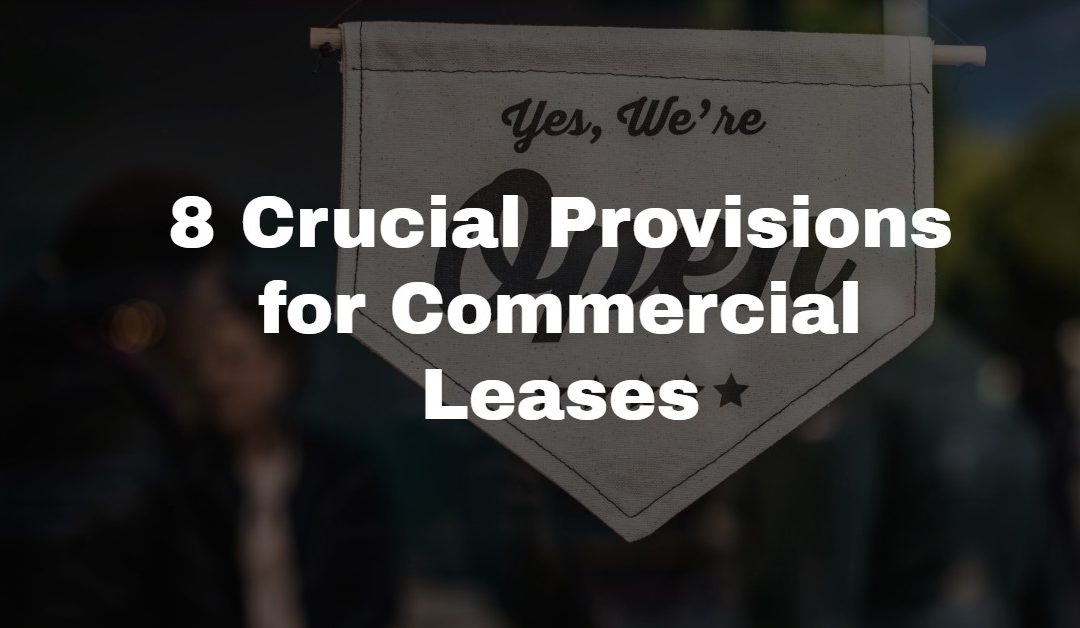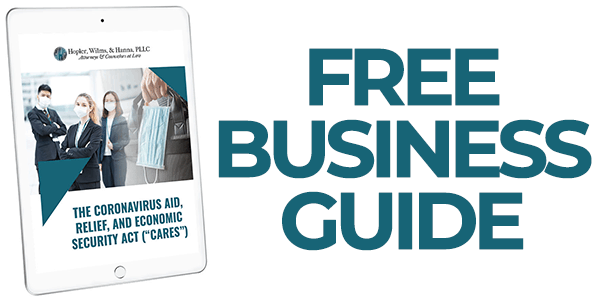Starting a new business includes answering a lot of questions that you may not have thought about before, including where you want to operate. You may need to lease an office or retail space to run your small business and you want to make sure your business is protected and to avoid any predatory leasing terms.
However, this may not be something you have considered before and you may not know what to look for when creating or signing a commercial lease. Our firm can definitely give you some ideas of what to have in your lease and our attorneys can always review these documents for you to answer any questions.
First of all, a commercial lease is a contract between a landlord and a business for the rental of property. This property could be a small office space or a large retail space. It may be beneficial for you to rent the property rather than own it as that requires less capital.
If the lease is a certain duration (generally one to three years, depending on the state), it is required to be in writing and signed. However, it is always a good idea for all leases to be in writing, no matter how long the duration. A written lease can protect you if the landlord doesn’t hold up their end of the bargain, unlike a verbal or informal agreement. When reviewing your lease, you should make sure it has certain terms that are extremely important for running your business and protecting it. These include:
1: Information about the space. The lease should include specific information about the space you are renting. You want to make sure it includes information about the common area(s), hallways, restrooms, stairs, elevators, offices, and other physical spaces found inside or outside. It should also include the square footage and how that was measured.
2. Cost of renting the property. It seems like common sense, but one of the most important things to look for in the lease is the cost of renting the space. You want to make sure it is something your business can afford. You also want to make sure the lease spells out when you need to pay and how payment is accepted. Do they accept major credit cards? Is there a fee for that? Do you need to mail a check or is there an online portal? Can you set up an autodraft feature with your bank? Depending on your business needs, certain types of payment options may be more convenient to you and you may want to make sure that is reflected in your lease.
Your will also want to check your lease to see if you are responsible for other charges, such as taxes, utilities, insurance, maintenance, water, and other expenses associated with the building. Depending on the lease, you may be responsible for some while your landlord is responsible for others. Make sure you note what is your responsibility to ensure you are properly following the terms of the lease.
The lease will probably contain escalation clauses allowing the landlord to increase the cost of renting the property by a certain percentage and certain intervals (for example, the cost of leasing the property may go up by 3% every year). You want to make sure the lease is clear on how that percentage is calculated and when. An attorney can certainly advise on any questions you have if you are not clear about the escalation clause.
Another important cost aspect is the rent abatement clause. This clause can limit your business’ risk if the space is damaged by reducing or stopping rent payments until the damage can be repaired. Be on the lookout in your lease – some landlords will try to put exceptions in the lease if the damage is caused by you or your employee(s). Try to avoid those or work with an experienced attorney to negotiate the terms with your landlord.
3: How long to enter into the lease. When you first start your business, you may already be thinking long term about where you will be in five or ten years. You may see a space and think “this is perfect!” at the start of everything and be willing and excited to rent the space for the long term. You may think you want to stay in that space for years to come and sign a lease for five or even ten years.
This guarantees that you will not have to move your business at the end of your lease and have to deal with the issues of moving, finding a new space, and updating your addresses. If you are planning to make a lot of changes to the space, this type of lease could also be beneficial for you, especially if the lease specifies that you are responsible for paying for the changes. You can read more about making modifications to the property in your lease below.
However, a longer lease has its downsides as well. If your business grows quickly, you may find yourself outgrowing the space, but stuck in a long-term lease. You may also find that the space doesn’t work the way you want it to. If this is the case, you may be able to modify it somewhat, but depending on the terms of your lease, that could be an expensive undertaking. A shorter lease with the ability to renew may work best for your business, especially if you expect to grow.
4. Use of the space. You want to make sure that you are able to use the space the way your business needs it to be used. If you plan to put up a sign, use the space around the building or office, play music, etc., you want to make sure that is included in the lease. You want to be able to run your business the best way possible and proper use of the space is crucial to that.
5: Modifications to the property. Depending on the type of business you have, you may need to make adjustments to the property you rent. It is essential that the lease spell out what type of modifications you are allowed to make as well as who is responsible for paying for them. You want to make sure you understand what you can and cannot do to your space, which could include painting, adding space, etc.
Another important factor that should be included is who owns the modifications at the end of the lease. These modifications may include making the space comply with the Americans with Disabilities Act. Regardless of what you may need to do to the space, it is important that it be reflected in your lease to prevent any miscommunication or misunderstanding. You may want to work that out with your landlord to make sure that your rights are preserved if you do need to make modifications and an attorney can also make sure of this in your lease.
6. Subletting or Assignment of the property. You will want a clause that allows you to sublet or assign your lease included in your commercial lease. This clause will give you some additional flexibility if you need to change locations or sell your business. This clause is useful if you wish to sublet all or part of your business space and if you want to include the lease in the sale of the business.
7. Competition. Some businesses do not want similar businesses near them due to competition. If you feel your business would be adversely affected by similar competing businesses in the same area, you may want a provision restricting the landlord from leasing to competing businesses in your lease.
8. Termination of your lease. No one can predict the future and if you are entering into a multi-year lease, you will want something included in case you need to terminate your lease early. This clause will include specific reasons the tenant, landlord, or both parties can terminate the lease early as well as any early termination fees.
This is definitely something that you want in your lease to avoid penalties or litigation and is helpful if, for example, you have to close or sell your business. You definitely want this clause included if you enter into a long-term lease in case something happens to your business that forces you to leave your physical space.
Owning a business comes with a lot of responsibilities and decisions to be made. You should have to overly worry about signing a predatory lease that is detrimental to your business as a whole. The above provisions will help make sure the lease for your space is serving you the way you need it to serve you and the attorneys at Hopler, Wilms, & Hanna are happy to review or draft commercial leases to ensure you are getting a fair deal. Call or go online or an appointment today!
Do you need to speak with a Business Attorney about your lease agreements? Call us today at 919-244-2019.


